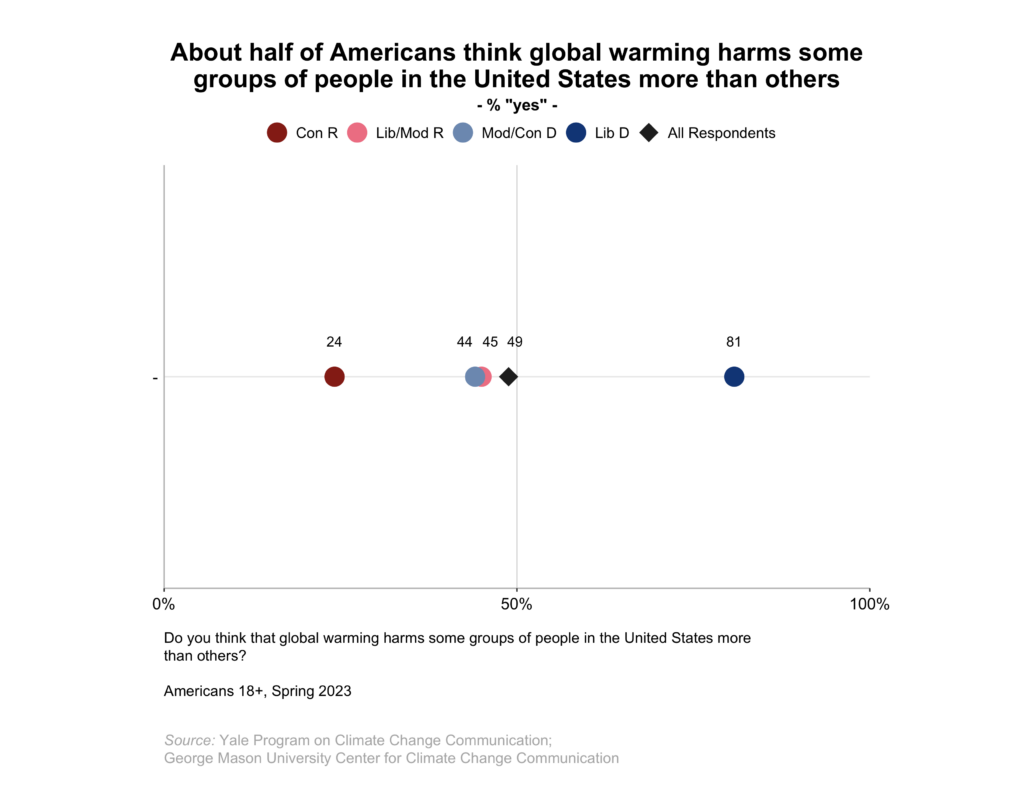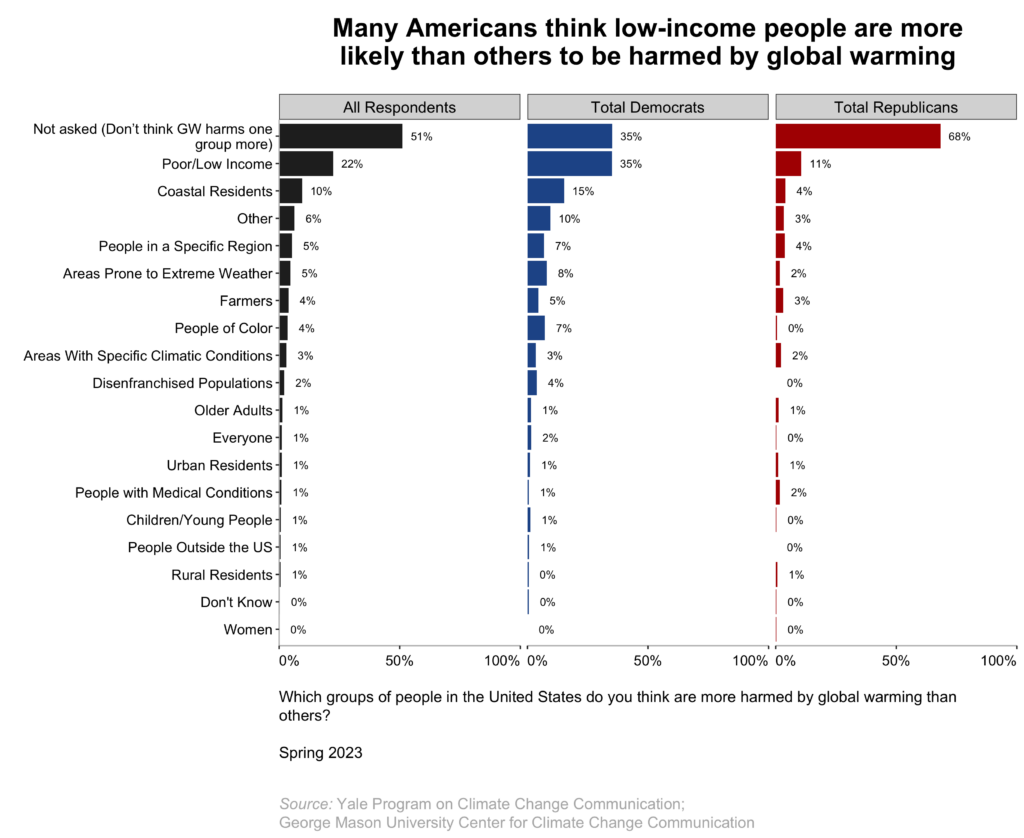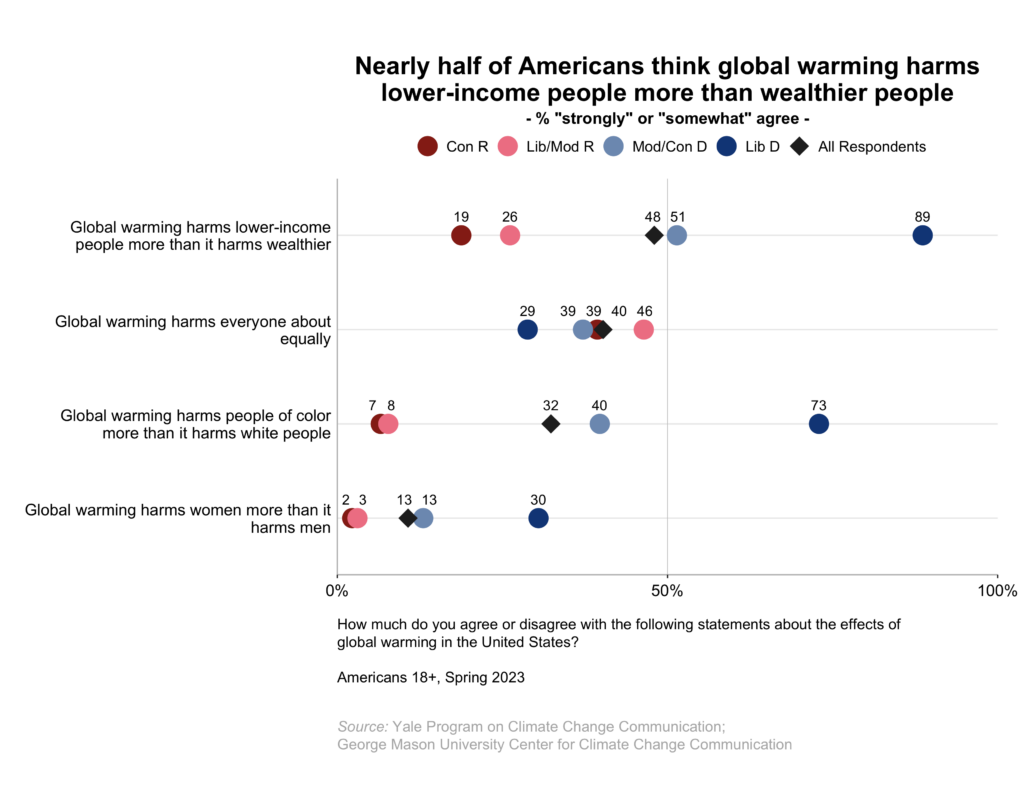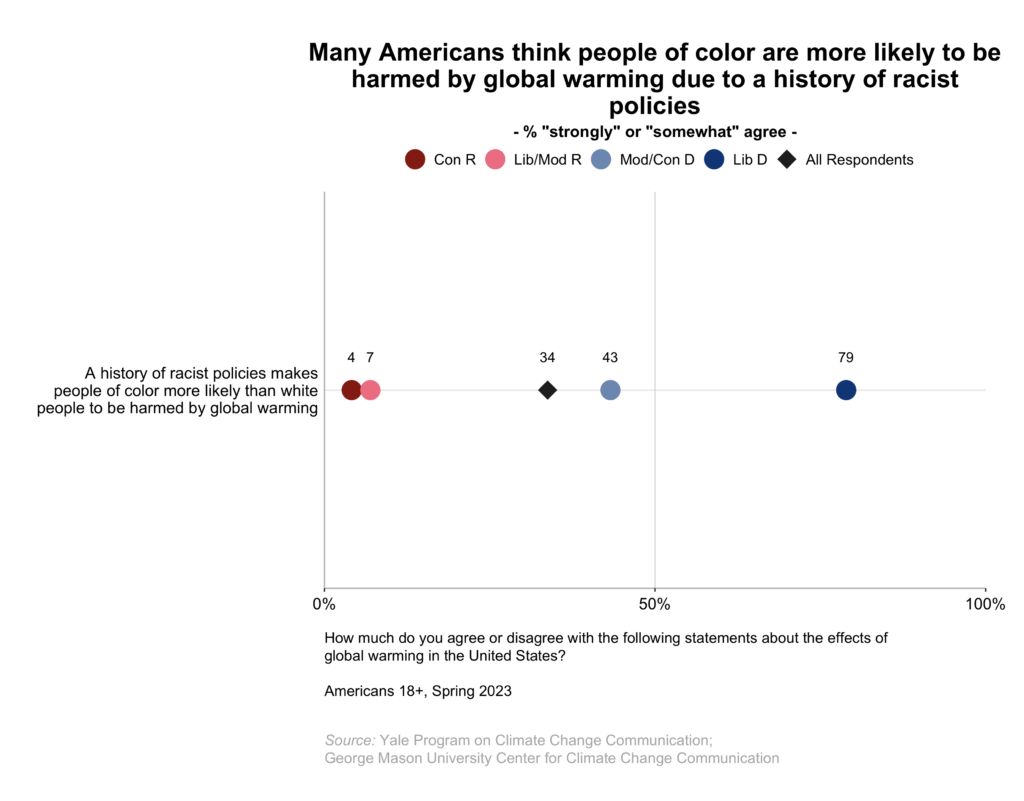Report · Sep 12, 2023
Climate Change in the American Mind: Climate Justice, Spring 2023
By Jennifer Carman, Matthew Ballew, Danning (Leilani) Lu, Anthony Leiserowitz, Edward Maibach, Seth Rosenthal, John Kotcher, Emily Goddard, Joshua Low, Jennifer Marlon, Marija Verner, Sanguk Lee, Teresa Myers, Matthew Goldberg, Nicholas Badullovich, Tracy Mason, Andrea Aguilar, Sha Merirei Ongelungel, Karina Sahlin, Cristian Sanchez, Irene Burga, Mark Magaña, Saad Amer, Romona Taylor Williams, Montana Burgess, Grace McRae, Makeda Fekede, Manuel Salgado, Annika Larson, Kristin Barendregt-Ludwig, Michel Gelobter and Gerald Torres
Filed under: Beliefs & Attitudes
1. Americans’ Beliefs About Who Is Harmed Most by Global Warming
1.1. About half of Americans think global warming harms some groups of people in the United States more than others.
Global warming poses risks to everyone, but some groups — including people of color, people with less wealth, older people, and people with pre-existing health conditions — are more vulnerable than others to these risks.EPA. (2021). Climate Change and Social Vulnerability in the United States: A Focus on Six Impacts. U.S. Environmental Protection Agency, EPA 430-R-21-003. www.epa.gov/cira/social-vulnerability-report About half of Americans (49%) think global warming harms some groups in the United States more than others (refer to data tables, p. 22). This includes a large majority of liberal Democrats (81%), more than four in ten liberal/moderate Republicans (45%) and moderate/conservative Democrats (44%), and about one in four conservative Republicans (24%).

All survey participants who said global warming harms some groups of people in the United States more than others were then asked the open-ended question: “Which groups of people in the United States do you think are more harmed by global warming than others?” Responses to that question were then categorized for analysis (refer to data tables, p. 22; for descriptions of all categories, see pp.31–32).
When asked to name which groups are more likely to be harmed than others by global warming, the most common response was poor or low-income people (22%), followed by coastal residents (10%). Among the political groups, both Democrats (35%) and Republicans (11%) were most likely to identify poor or low-income people as the group more harmed than others by global warming. However, most Republicans (68%) were not asked the question because they did not think any group would be harmed more than others.

1.2. Nearly half of Americans think global warming harms lower-income people more than wealthier people. Fewer think it harms people of color more than white people, or women more than men.
When directly asked their level of agreement about whether global warming harms specific groups of people more than others, nearly half of Americans (48%) agreed that global warming harms lower-income people more than it harms wealthier people (refer to data tables, pp. 23-24). This includes a large majority of liberal Democrats (89%), about half of moderate/conservative Democrats (51%), about one in four liberal/moderate Republicans (26%), and two in ten conservative Republicans (19%).
About one in three Americans (32%) think global warming harms people of colorRespondents received the following definition for communities of color and people of color in the survey: “Some of the following questions use the phrases ‘communities of color’ or ‘people of color,’ which refer to Black Americans, Latinos/Hispanics, Asian Americans, Pacific Islanders, Native Americans, etc. in the United States.” more than it harms white people, including most liberal Democrats (73%) and about four in ten moderate/conservative Democrats (40%). Only about one in ten liberal/moderate Republicans (8%) or conservative Republicans (7%) think so. By contrast, fewer Americans (13%) think that global warming harms women more than it harms men, including 30% of liberal Democrats, 13% of moderate/conservative Democrats, 3% of liberal/moderate Republicans, and 2% of conservative Republicans.
About four in ten Americans (40%) think global warming harms everyone about equally, including more than four in ten liberal/moderate Republicans (46%), about four in ten moderate/conservative Democrats (39%) and three in ten liberal Democrats (29%). About four in ten conservative Republicans think global warming harms everyone about equally (39%), but because this group is less likely to perceive risks from global warming, this group may be the most likely to think that global warming will harm everyone “about equally” because they think global warming will not harm anyone.

1.3. Many Americans think people of color are more likely to be harmed by global warming due to a history of racist policies.
One aspect of climate justice is understanding that historical policies have made people of color more vulnerable to climate change impacts. For example, neighborhoods in the U.S. that experienced the racially discriminatory housing practice of redlining are now often much hotter in the summer than non-redlined neighborhoods in the same cities.Hoffman, J. S., Shandas, V., & Pendleton, N. (2020). The Effects of Historical Housing Policies on Resident Exposure to Intra-Urban Heat: A Study of 108 US Urban Areas. Climate, 8(1), 12. https://doi.org/10.3390/cli8010012
About one in three Americans (34%) agree that a history of racist policies makes people of color more likely than white people to be harmed by global warming. This includes a majority of liberal Democrats (79%) and about four in ten moderate/conservative Democrats (43%), but few liberal/moderate Republicans (7%) or conservative Republicans (4%). About one in three Americans (34%) say they neither agree nor disagree with this statement, and about one in three say they disagree (30%; refer to data tables, p. 24).
